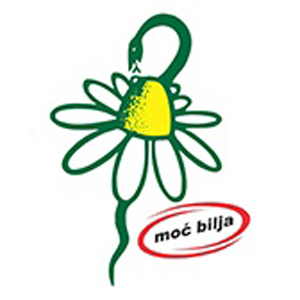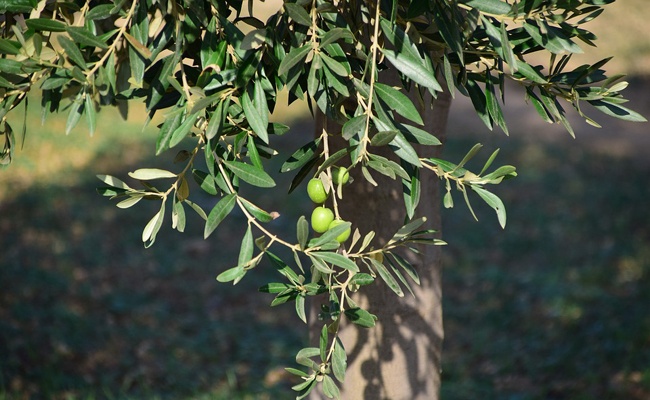
One of the ancient Greek legends tells of an unusual competition between Poseidon and Athena that took place for the following reason:
 Seeking a name for their newly founded settlement on the Aegean Sea coast, the inhabitants sought the support of the gods. They decided to name the settlement after the deity who offered the most significant gift and regularly offer sacrifices to it. The settlement was beautiful, the people were hardworking and wealthy, so the god of the sea, Poseidon, and the goddess of wisdom, Athena, entered into a competition. Poseidon, with his trident, touched one of the rocks, and water flowed from it. Since there was already an abundance of water around them, the inhabitants were not particularly impressed by Poseidon's gift. They turned to Athena, who casually threw a seed on the ground: from it grew a powerful tree with a wide canopy, richly laden with fruit. And so, the settlement, thanks to the olive tree, was named Athena, a name it has proudly and gratefully carried for millennia.
Seeking a name for their newly founded settlement on the Aegean Sea coast, the inhabitants sought the support of the gods. They decided to name the settlement after the deity who offered the most significant gift and regularly offer sacrifices to it. The settlement was beautiful, the people were hardworking and wealthy, so the god of the sea, Poseidon, and the goddess of wisdom, Athena, entered into a competition. Poseidon, with his trident, touched one of the rocks, and water flowed from it. Since there was already an abundance of water around them, the inhabitants were not particularly impressed by Poseidon's gift. They turned to Athena, who casually threw a seed on the ground: from it grew a powerful tree with a wide canopy, richly laden with fruit. And so, the settlement, thanks to the olive tree, was named Athena, a name it has proudly and gratefully carried for millennia.
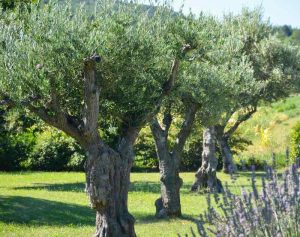 The Mediterranean region is the homeland of the olive, which has been cultivated in this area since the Bronze Age. The olive tree belongs to the Oleaceae family. Its trees typically reach a height of 6 to 8 meters and are known for their longevity: some trees in this region are over 2,000 years old. They bloom during May and June, and bear fruit in early autumn. Olive flowers are pleasantly scented and pale yellowish-white in color, while the oval fruits consist of a fleshy part (pericarp) and a seed. The fruits are rich in unsaturated fatty acids – containing oleic and palmitic acids; and among the saturated ones, stearic and arachidic acids. In addition to fatty acids, the fruits are rich in flavonoids, phenolic acids, anthocyanins, triterpenes (oleanolic acid), and waxes, while the leaves contain essential oil, sugars, and fruit acids.
The Mediterranean region is the homeland of the olive, which has been cultivated in this area since the Bronze Age. The olive tree belongs to the Oleaceae family. Its trees typically reach a height of 6 to 8 meters and are known for their longevity: some trees in this region are over 2,000 years old. They bloom during May and June, and bear fruit in early autumn. Olive flowers are pleasantly scented and pale yellowish-white in color, while the oval fruits consist of a fleshy part (pericarp) and a seed. The fruits are rich in unsaturated fatty acids – containing oleic and palmitic acids; and among the saturated ones, stearic and arachidic acids. In addition to fatty acids, the fruits are rich in flavonoids, phenolic acids, anthocyanins, triterpenes (oleanolic acid), and waxes, while the leaves contain essential oil, sugars, and fruit acids.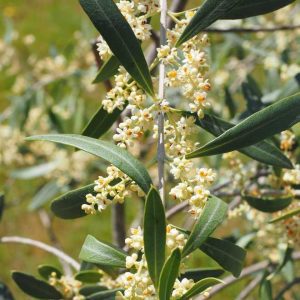
In the mid-3rd century BCE, the commercial importance of olives grew in trade between Greece and Palestine, primarily due to the trade of high-quality olive oil.
The highest quality olive oil is obtained through a cold-pressing method, by pressing the fruits under pressure, ensuring that the pits remain intact. No additives are introduced into this "virgin" oil. It is of exceptional quality and contains a range of nutrients that contribute to the preservation of health.
Provencal oil is also produced through cold pressing, with the application of pressure, which may result in the crushing of the pits. This oil is characterized by a very pleasant aroma and taste.
Wood oil is of lower quality and is obtained by re-pressing the remaining pulp after the production of the first two oils, with the application of heat. This oil is primarily used in the production of soaps and technical oils.
.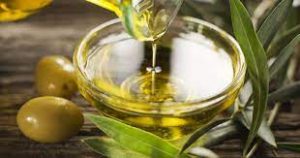 Virgin olive oil, as a regular component of the diet and the basis of the "Mediterranean diet," acts as a natural cholagogue, stimulating bile secretion. For this purpose, it is recommended to consume a teaspoon of olive oil before meals, on an empty stomach. In traditional medicine, it is used in treatments for the removal of gallstones, and for children and the elderly, it serves as a mild laxative and is also used for enemas. When taken orally, it positively influences appetite stimulation, alleviates inflammation of the stomach and intestinal mucosa, aids digestion, and can be used for bleeding hemorrhoids. It is also believed that applying olive oil to the eyelids can improve vision. Olive oil is a well-known remedy for healing open sores and is used in the form of warm compresses. Due to its beneficial effects on the skin, olive oil has extensive applications in the production of cosmetic products.
Virgin olive oil, as a regular component of the diet and the basis of the "Mediterranean diet," acts as a natural cholagogue, stimulating bile secretion. For this purpose, it is recommended to consume a teaspoon of olive oil before meals, on an empty stomach. In traditional medicine, it is used in treatments for the removal of gallstones, and for children and the elderly, it serves as a mild laxative and is also used for enemas. When taken orally, it positively influences appetite stimulation, alleviates inflammation of the stomach and intestinal mucosa, aids digestion, and can be used for bleeding hemorrhoids. It is also believed that applying olive oil to the eyelids can improve vision. Olive oil is a well-known remedy for healing open sores and is used in the form of warm compresses. Due to its beneficial effects on the skin, olive oil has extensive applications in the production of cosmetic products.
Although olive oil is the cornerstone of the "Mediterranean" diet, which has beneficial effects on health, the medicinal properties of olive leaves should never be overlooked.

Traditionally, olive leaf tea is used as a digestive aid and as a diuretic to help eliminate excess fluids. It has a positive effect on the cardiovascular system, alleviating hypertension i reducing blood sugar and cholesterol levels. In folk medicine, olive leaf tea is used for jaundice, ear infections, as well as to relieve cough and gum inflammation.
Glycerin macerate of young olive shoots is recommended to improve circulation and calm the nervous system.
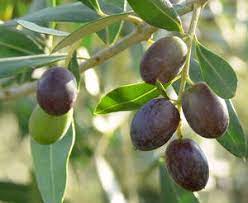 In culinary practices, fresh olives are used in various salads, while the oil is used in food preparation. Given the antioxidant and anti-inflammatory effects of the active components in olive fruits, the low incidence of cardiovascular and malignant diseases among individuals who follow the "Mediterranean diet" is understandable.
In culinary practices, fresh olives are used in various salads, while the oil is used in food preparation. Given the antioxidant and anti-inflammatory effects of the active components in olive fruits, the low incidence of cardiovascular and malignant diseases among individuals who follow the "Mediterranean diet" is understandable.
The "Mediterranean diet" is primarily recommended for maintaining heart and vascular health.
It is believed that the success of this diet is based on the significant intake of olive oil, vegetables, and seafood. Olives are consumed whole, either green or black, or in the form of oil, and olive leaf tea is also used.
Recent studies on olive leaf extracts in laboratory conditions have shown significant antimicrobial activity against bacteria that cause gastrointestinal and respiratory infections, including antibiotic-resistant strains such as Staphylococcus aureus, Escherichia coli, and Candida albicans. Additionally, antiviral activity against the HIV-1 virus has been observed.
Olive leaf extracts also contain active compounds with pronounced antioxidant properties, which exhibit a protective effect on the stomach mucosa and inhibit the proliferation of malignant cells in breast cancer, bladder cancer, and leukemia.
Recent studies show that the beneficial effects of olives on the cardiovascular system are primarily attributed to hydroxytyrosol, a phenolic compound with antioxidant properties. This compound is formed through the breakdown of the bitter substance oleuropein into elenolic acid and hydroxytyrosol during the maturation of the fruit, as it transitions from green to black
In addition to being present in the fruit, this compound is also found in significant amounts in the leaves, and in smaller quantities in the oil, as it is primarily water-soluble. Leaves and the remnants of the fruit after oil extraction are used as a source for the extraction of oleuropein and hydroxytyrosol, compounds with pronounced antimicrobial, antioxidant, cardioprotective, anti-inflammatory, neuroprotective, and antitumor properties. This compound contributes to skin protection during prolonged sun exposure, acts as a modulator of metabolic syndrome, and also helps in the prevention of respiratory infections.
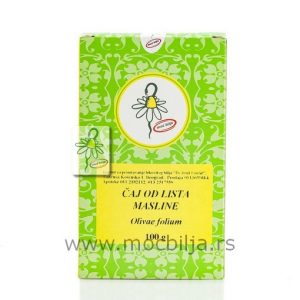
In animal studies, it has been shown that this compound plays a role in insulin sensitivity and the prevention of diabetic polyneuropathy. Hepatoprotective effects have also been demonstrated, with a reduction in the frequency of insulin resistance in diets high in fats. Beneficial health effects include the reduction of platelet aggregation, lowering of high blood pressure, inhibition of endothelial inflammation in blood vessels, and blockage of the formation of new blood vessels in inflamed tissue.
Our product line includes Olive Leaf Tea, and olive oil is a key ingredient in Hypericum in Olive Oil and the Mosquito Bite Relief Gel. Olive leaf is also included in the formulation of Tea for Diabetes, BC Tea for Better Circulation, Tea for Angina Pectoris i Tea for Alleviating Symptoms of Cardiac Arrhythmia.

